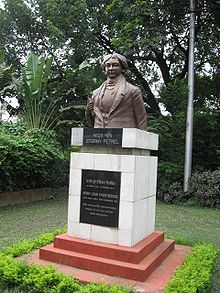Henry Louis Vivian Derozio
| Henry Louis Vivian Derozio | |
|---|---|

Bust of Derozio at the Esplanade
|
|
| Born |
18 April 1809 Kolkata, West Bengal, India |
| Died | 26 December 1831 (aged 22) South Park Street Cemetery, Mother Teresa Sarani, Kolkata, India |
| Occupation | Teacher and poet |
| Language | English and Bengali |
| Nationality | Indian |
| Ethnicity | Luso-Indian |
| Citizenship | Indian |
| Genre | academic, educator |
| Literary movement | Bengal Renaissance |
| Notable works | To India - My Native Land |
Henry Louis Vivian Derozio (18 April 1809 – 26 December 1831) was an Indian poet and assistant headmaster of Hindu College, Kolkata, a radical thinker and one of the first Indian educators to disseminate Western learning and science among the young men of Bengal.
Long after Derozio's death (of cholera), his influence lived on among his former students, who came to be known as Young Bengal and many of whom became prominent in social reform, law, and journalism.
Henry Louis Vivian Derozio was born on 18 April 1809 at Entally-Padmapukur in Kolkata. His father Francis Derozio was a well-respected man in Anglo-Indian community. His original family name was 'De Rozario'. (Also spelt D'Rozario) He attended David Drummond's Dhurramtallah Academy school, where he was a pupil from the age of eight to fourteen.
He quit school at the age of 14 and initially joined his father's concern at Kolkata and later shifted to Bhagalpur. Inspired by the scenic beauty of the banks of the River Ganges, he started writing poetry.
This was the time when Hindu society in Bengal was undergoing considerable turmoil. In 1828, Raja Ram Mohan Roy established the Brahmo Samaj, which kept Hindu ideals but denied idolatry. This resulted in a backlash within orthodox Hindu society. It is in the perspective of these changes that Derozio was appointed at Hindu college, where he helped released the ideas for social change already in the air. At 17 years of age,he was considered a great scholar and a thinker. Within a short period of time, he drew around him a group of intelligent boys in college. He constantly encouraged them to think freely, to question and not to accept anything blindly. His teachings inspired the development of the spirit of liberty, equality and freedom. His activities brought about intellectual revolution in Bengal. It was called the Young Bengal Movement and his students, also known as Derozians, were fiery patriots.
In May 1826, at the age of 17, he was appointed teacher in English literature and history at the new Hindu College, Derozio's intense zeal for teaching and his interactions with students created a sensation at Hindu College. His students came to be known as Derozians. He organised debates where ideas and social norms were freely debated. In 1828, he motivated them to form a literary and debating club called the Academic Association.
...
Wikipedia
